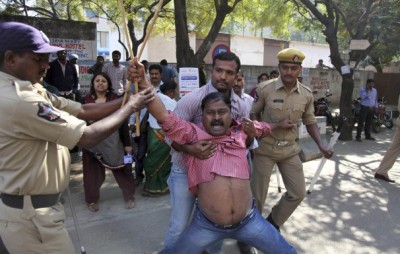 The young Indian diplomat had already had prestigious postings in Pakistan, Italy and Germany. Last year, as she prepared for an assignment in pricey New York, she decided to hire a babysitter to accompany her, her husband and two daughters.
The young Indian diplomat had already had prestigious postings in Pakistan, Italy and Germany. Last year, as she prepared for an assignment in pricey New York, she decided to hire a babysitter to accompany her, her husband and two daughters.
Devyani Khobragade thought she had found the right employee in a woman named Sangeeta Richard. U.S. labor rules required that the sitter be paid $9.75 an hour.
But authorities allege that Khobragade drew up two contracts — one with the proper amount and one with the actual amount paid (about $3.31 an hour for a 40-hour workweek, a wage that would often amount to much less because of longer hours worked).
Khobragade’s arrest last week on visa fraud charges and her subsequent treatment by U.S. authorities have touched off a major diplomatic row with the United States, India’s ally, culminating with the New Delhi government demanding an unconditional apology and curtailing U.S. diplomats’ privileges and security measures.
In a mark of how serious the dispute has become, Secretary of State John F. Kerry called India’s national security adviser Wednesday and “expressed his regret” over the incident, according to the State Department.
And Indian officials announced they were transferring Khobragade to their country’s mission to the United Nations. The move, if approved, would give her full immunity from other charges going forward.
Khobragade, 39, India’s deputy consul general in New York, was dropping off one of her daughters at school last Thursday when agents of the U.S. Diplomatic Security Service descended and arrested her.
Later, she was strip-searched and — she claims — cavity-searched by U.S. marshals; the Marshals Service is charged with housing federal prisoners. Experts said that was unheard-of treatment for a diplomat arrested by a friendly country. (A spokeswoman for the agency says that Khobragade was merely strip-searched.)
U.S. officials have maintained that as a consulate employee, Khobragade was entitled only to limited immunity, for acts related to her consular duties, rather than the full immunity accorded to other kinds of diplomats.
If found guilty of visa fraud and making false statements on a visa application, she could face 10 years in prison.
The case has struck a nerve in deeply traditional India, where a woman’s modesty is still considered sacrosanct. India’s national security adviser, Shivshankar Menon, has called Khobragade’s treatment “despicable and barbaric.”
Kerry, in his call with Menon, said he “empathizes with the sensitivities we are hearing from India,” a State Department statement said.

The secretary “understands very deeply the importance of enforcing our laws and protecting victims, and, like all officials in positions of responsibility inside the U.S. government, expects that laws will be followed by everyone here in our country,” it said. “It is also particularly important to Secretary Kerry that foreign diplomats serving in the United States are accorded respect and dignity just as we expect our own diplomats should receive overseas.”
At a briefing at the State Department, deputy spokeswoman Marie Harf would not characterize the conversation as an apology. She said the tone was “positive.”
On Tuesday, India revoked the identity cards of U.S. consular personnel and their families, rescinded airport passes, froze embassy imports of liquor and other goods, and began investigating salaries paid to Indian staff members at U.S. consulates, as well as those teaching at U.S. schools in the country.
The outcry continued Wednesday. Politicians complained on the floor of Parliament. The hashtag “#devyanihumiliated” trended on Twitter. A Times of India headline read “Strip Search finds India’s Spine.” Small anti-American protests flared in New Delhi and a few other cities.
Karl F. Inderfurth, a former U.S. assistant secretary of state for South Asian affairs who is at the Center for Strategic and International Studies, said the timing of the incident contributed to the strong reaction.
“India is immersed right now in a societal debate on the proper treatment — respectful, not degrading — of women within its own society. That’s another reason why this is striking an Indian nerve,” he said in an e-mail.
Bharara, the Manhattan U.S. attorney, said Khobragade was charged because “she clearly tried to evade U.S. law designed to protect from exploitation the domestic employees of diplomats and consular officers. Not only did she try to evade the law, but as further alleged, she caused the victim and her spouse to attest to false documents and be a part of her scheme to lie to U.S. government officials.”
In a statement issued Thursday, Manhattan U.S. Attorney Preet Bharara said “Khobragade was accorded courtesies well beyond what other defendants” typically receive. “She was not, as has been incorrectly reported, arrested in front of her children. The agents arrested her in the most discreet way possible, and unlike most defendants, she was not then handcuffed or restrained,” Bharara said.
The statement said Kobragade was “fully searched by a female deputy marshal — in a private setting … but this is standard practice for every defendant, rich or poor, American or not.”
U.S. officials have maintained that as a consulate employee, Khobragade was entitled only to limited immunity, for acts related to her consular duties, rather than the full immunity accorded to other kinds of diplomats.
If found guilty of visa fraud and making false statements on a visa application, she could face 10 years in prison.
The case has struck a nerve in deeply traditional India, where a woman’s modesty is still considered sacrosanct. India’s national security adviser, Shivshankar Menon, has called Khobragade’s treatment “despicable and barbaric.”
Kerry, in his call with Menon, said he “empathizes with the sensitivities we are hearing from India,” a State Department statement said.
The secretary “understands very deeply the importance of enforcing our laws and protecting victims, and, like all officials in positions of responsibility inside the U.S. government, expects that laws will be followed by everyone here in our country,” it said. “It is also particularly important to Secretary Kerry that foreign diplomats serving in the United States are accorded respect and dignity just as we expect our own diplomats should receive overseas.”
At a briefing at the State Department, deputy spokeswoman Marie Harf would not characterize the conversation as an apology. She said the tone was “positive.”
On Tuesday, India revoked the identity cards of U.S. consular personnel and their families, rescinded airport passes, froze embassy imports of liquor and other goods, and began investigating salaries paid to Indian staff members at U.S. consulates, as well as those teaching at U.S. schools in the country.
The outcry continued Wednesday. Politicians complained on the floor of Parliament. The hashtag “#devyanihumiliated” trended on Twitter. A Times of India headline read “Strip Search finds India’s Spine.” Small anti-American protests flared in New Delhi and a few other cities.
Karl F. Inderfurth, a former U.S. assistant secretary of state for South Asian affairs who is at the Center for Strategic and International Studies, said the timing of the incident contributed to the strong reaction.
“India is immersed right now in a societal debate on the proper treatment — respectful, not degrading — of women within its own society. That’s another reason why this is striking an Indian nerve,” he said in an e-mail.
Bharara, the Manhattan U.S. attorney, said Khobragade was charged because “she clearly tried to evade U.S. law designed to protect from exploitation the domestic employees of diplomats and consular officers. Not only did she try to evade the law, but as further alleged, she caused the victim and her spouse to attest to false documents and be a part of her scheme to lie to U.S. government officials.”
Bharara said that after Khobragade created the false documents she “went ahead with lying to the U.S. government about what she was doing.”
Khobragade’s attorney, Daniel N. Arshack, said Wednesday that the diplomat actually had submitted one contract to the U.S. government, listing the proper salary for her domestic help, and had drawn up another with the woman, to deduct money from her pay to be sent to support her family in India.
Khobragade’s relationship with the babysitter grew troubled about six months after she started work. Arshack said that the babysitter asked whether she could work part time for other clients, and then stole items and later disappeared in June.
On Wednesday, the Indian embassy in Washington released its timeline of events, which detailed how they had been trying to work to resolve the dispute between Khobragade and her babysitter — with no American response — long before the State Department contacted them on the matter Sept. 4. The Indian embassy said that they had sought help from the U.S. in tracing the nanny after she left Khobragade’s New York home June 23. Khobragade had had reported her missing to the Office of Foreign Missions in New York and the New York police.
According to the embassy, they had sought help arresting Richard, whose passport had been revoked and had allegedly stolen cash, a mobile phone and documents from Khobragade. The timeline suggests that the embassy sought action against blackmailing by Richard, who they said was demanding she be permitted to change her passport, visa status and to work elsewhere, a violation of U.S. regulations.

An arrest warrant was issued against Richard in New Delhi on Nov. 19 and was forwarded Dec. 6 to the State Department and U.S. Embassy in Delhi, asking for their assistance in returning Richard to India.
On Wednesday, both Arshack and Indian officials said Khobragade, who had been deputy consul general for political, economic, commercial and women’s affairs since November 2012, had been transferred to the country’s permanent mission to the United Nations.
Harf said the State Department has not received any notice about transferring Khobragade’s diplomatic assignment.
Such a request would be made to the United Nations, which would then refer it to the State Department for review, Harf said.
The U.S. government has the authority to turn down such requests on national security grounds, officials said.
Arshack said the move would provide retroactive diplomatic immunity, although U.S. officials said that did not appear to be the case.
“We fully expect her diplomatic status will be respected by the United States, and this will get resolved in a political and diplomatic way,” Arshack said.
Khobragade has remained publicly silent. But she wrote a note this week thanking her Indian diplomatic colleagues for their support.
“I must admit that I broke down many times as the indignities of repeated handcuffing, stripping and cavity searches, swabbing, hold up with common criminals and drug addicts were all being imposed upon me despite my incessant assertions of immunity,” she wrote in the e-mail, made available to The Washington Post
Washington Post

Leave a Reply
You must be logged in to post a comment.